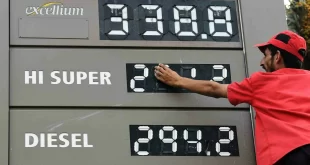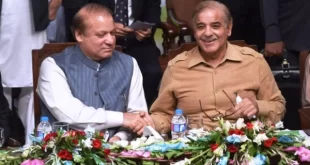The monthly PDL hikes of Rs. 5 and Rs. 10 for gasoline and diesel; no currency rate intervention; a 10-week import reserve cover; and the phaseout of the Ehsas Ration Program
ISLAMABAD: The government has committed to the International Monetary Fund (IMF) to increase the petroleum development levy (PDL) on gasoline and diesel to a maximum of Rs50 per liter by January and April of 2023, respectively.
Pakistan has made unwavering commitments to increase its foreign exchange reserves to cover at least 10 weeks of imports by the end of the current fiscal year from the current 5 weeks and never to use those reserves to support the exchange rate in its Letter of Intent (LoI) submitted to the IMF for formal approval of the completion of the 7th and 8th reviews of the $7 billion Extended Fund Facility (EFF).
The Fund’s Executive Board meeting for Pakistan’s combined seventh and eighth reviews under the EFF has been rescheduled for August 29, according to a statement made by IMF Country Representative Esther Perez Ruiz on Wednesday.
The federal cabinet will also need to approve the government’s “implementation plan of monthly PDL increases of Rs10/litre for petrol and Rs5/litre for diesel on Sept 1, 2022, followed by increases of Rs5 per month for both fuels until the PDL reaches Rs50 in January for petrol and April for diesel.” Currently, the PDLs are Rs20 for petrol and Rs10 for high-speed diesel, kerosene, and light diesel oil.
Additionally, during the fiscal year, the government will phase out the Ehsas Ration Riyat Program and continue with Sasta Fuel Sasta Diesel (SFSD) until a clean sunset in June 2023.
But this year, the monthly BISP would be increased to Rs316 billion to support nine million people under the Ehsas Emergency Cash and unconditional cash transfer programs.
The government promised to “stay dedicated to guaranteeing monetary and financial stability by rebuilding foreign exchange reserves, decreasing inflation towards the objective, and maintaining a market-determined exchange rate” under the terms of the LoI.
In order to offset certain tax rollbacks and unintended increases in spending, the Ministry of Finance plans to pursue new revenue measures totaling around Rs150 billion over the course of the next few months.
“Continued commitment to a market-determined currency rate and external stability” is the planned course of action in this regard. According to the administration, a significant terms-of-trade shock, chronically high current account deficits, and a high level of uncertainty have made the external environment unstable in recent months.
See: Over the IMF’s head
The increasing demand for foreign currency from imports and external debt repayments put pressure on the exchange rate, which fell by more than 33 percent between the end of July and the end of December 2021, while reserves dropped to less than 1.5 months’ worth of imports.
In spite of the challenging external environment, the State Bank of Pakistan’s (SBP) interventions will continue to be guided by market conditions and the goal of rebuilding reserve buffers to bring reserves up to a more prudent level of at least 2.2 months of import coverage by end-FY23. “In this context, we remain committed to the market-determined exchange rate, which has served as an essential buffer protecting economic activity and reserves during this prolonged period of heightened uncertainty,” the LoI stated.
The central bank and Ministry of Finance have committed to not using forex sales to stop a fundamentally driven trend of rupee depreciation.
Additionally, the government will modernize the Debt Management Office (DMO), which will be in charge of creating and carrying out a debt management plan compliant with IMF and World Bank guidelines. The plan would combine disparate debt recommendations services. As a result of the May approval of the modified Fiscal Responsibility and Debt Limitation Act (2005) management, the Finance Division has been tasked with recruiting more employees in line with their obligations.
In order to finish by the end of November 2022, the government is now putting up the front, middle, and back offices of the new DMO. In March 2022, the DMO completed the transfer of pertinent functions from other government agencies. Additionally, the organization’s coordination with other government units—specifically, the Economic Affairs Division—was enhanced to guarantee the correct collection and dissemination of statistics pertaining to debt.
According to the administration, Pakistan is still dealing with a difficult political and economic climate. Although the country managed to contain the Covid-19 outbreak, the conflict in Ukraine has increased anxiety due to rising global commodity prices and unfavorable external funding terms. bigger inflation, bigger spreads, and a larger current account deficit have already been the results of this, and on April 11, the government was reorganized.
The previous administration reportedly approved a four-month relief package in February that included tax amnesty, fuel tax breaks, broad-based subsidies, and new exemptions from taxes. However, the current administration acknowledged that these measures “run against some of Pakistan’s previous commitments under its IMF-supported program and are not-in and of themselves conduciveto a sustainable macroeconomic environment.”
The government therefore committed to and carried out five previous actions in order to restore macroeconomic and external sustainability. These actions included the approval of the revised budget for 2023, the signing of Memorandums of Understanding with the provinces regarding provincial targets consistent with the budget’s Rs750 billion cash surplus target, the complete reversal of the February relief package, which included the complete elimination of general fuel subsidies and the Rs5/kWh blanket power subsidy in June, the introduction of PDL on petrol at Rs10/litre and diesel at Rs5/litre on July 1 and then doubling it on August 1 in addition to the tightening of monetary policy to 15 percent.
 Pakish News We are an interactive media group that here a purpose to update users with the latest information. Our mission is to give you knowledge not only about your surroundings. We will also update you around the Globe.
Pakish News We are an interactive media group that here a purpose to update users with the latest information. Our mission is to give you knowledge not only about your surroundings. We will also update you around the Globe.



